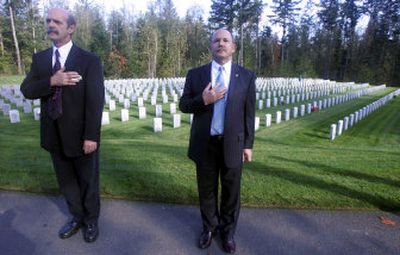Vets seek resting place this side of Cascades

Spokane County is home to more than 50,000 veterans, but when they die, loved ones often have a difficult choice: bury them at the state’s only national cemetery on the far side of the Cascades or inter them at a local civilian cemetery.
Such a decision can be especially hard for the poor because burial or inurnment of cremated remains is free at the Tahoma National Cemetery, near Kent. Such burials cost thousands of dollars at private graveyards, and many of the plots in local veterans’ sections have already been taken.
Now planning has begun to build a state veterans’ cemetery in Spokane County.
If approved by the U.S. Department of Veterans Affairs, the estimated $6 million in cemetery design, construction costs and initial equipment would be paid for by the federal government. Unlike a national veterans’ cemetery, however, maintenance and operational costs for this state cemetery would be assumed by Washington.
Some of the state money would come from the sale of the state’s new military license plates, said Spokane County Veterans Services Director Frank Thompson.
State legislators are scheduled to consider this session whether to approve design funding for the cemetery in Washington’s supplemental budget.
“I would like to be able to honor our veterans and their service. When they’re buried locally, it allows the families to visit them any time they want and relive the memories,” said Jerry Towne, who is heading up the project for the Washington Department of Veterans Affairs.
The majority of local veterans choose to be buried close to home rather than at Tahoma, a more than four hour drive from Spokane.
“Most of them just don’t want to go over there because they don’t know anyone over there, and it’s too far for their family to drive to visit them,” said Thompson.
The proposed cemetery would primarily serve Eastern Washington veterans, but it’s likely it would also accept Idaho and western Montana veterans, said Don Gillespie, the state’s veteran community services coordinator in Eastern Washington.
“The VA discourages residency requirements because a veteran is a veteran,” Gillespie explained.
And the U.S. Department of Veterans Affairs will decide whether Washington should get a grant to build the cemetery.
Approval is likely, said Towne.
There’s certainly a need.
“Because of the number of veterans we have in Eastern Washington and Northern Idaho, demographically it just makes sense to have one,” said Gillespie.
About 140,000 veterans now live in Eastern Washington, and another 23,000 in Idaho’s Kootenai, Bonner, Benewah and Latah counties. Veterans’ spouses will also be eligible for burial.
The Washington Department of Veterans Affairs studied six different sites, but has narrowed the list to five, with three top contenders – two near Medical Lake and one near Clear Lake. All are on property already owned by the state, and each has enough room to satisfy demand for veteran burials and inurnments for 50 years.
The plan is to pick a site by May, said Gillespie.
Both Medical Lake sites are adjacent to the lake on property owned by the Department of Social and Health Services, as part of the Eastern Washington State Hospital complex.
The Clear Lake site, just north of Interstate 90 near Cheney, is also on the lakefront in part, with some gentle and some steep slopes. It is owned by the Washington Department of Natural Resources.
All three preferred sites have some wetland areas.
In addition to the peaceful views of the lake and gently sloping hills, the property is also home to wildlife like blue heron and other waterfowl.
“Had I not owned my own (plot), I sure would have liked to be considered,” said veteran Jerry Gleesing of the prospect of an Eastern Washington veterans’ cemetery.
Gleesing served during World War II in the Army Air Corps, but he and his wife already have a plot at St. Joseph’s Cemetery in the Spokane Valley.
He said the national cemetery in Tahoma, where a buddy is buried, is beautiful, and a fitting resting place for veterans.
“We need something like that over here,” Gleesing said.
Veterans of Foreign Wars Post 51 Commander Doug Jones agreed.
Jones is an Air Force veteran of the Korean War. He said that many veterans are dying in the Spokane area, and they deserve a cemetery here because Tahoma is too far.
For his part, Thompson said that the state is doing what it can to make it happen.
“To have a veterans’ cemetery where everyone is a veteran – that’s a nice thing to have,” said Thompson. “You’re basically buried with your comrades.”